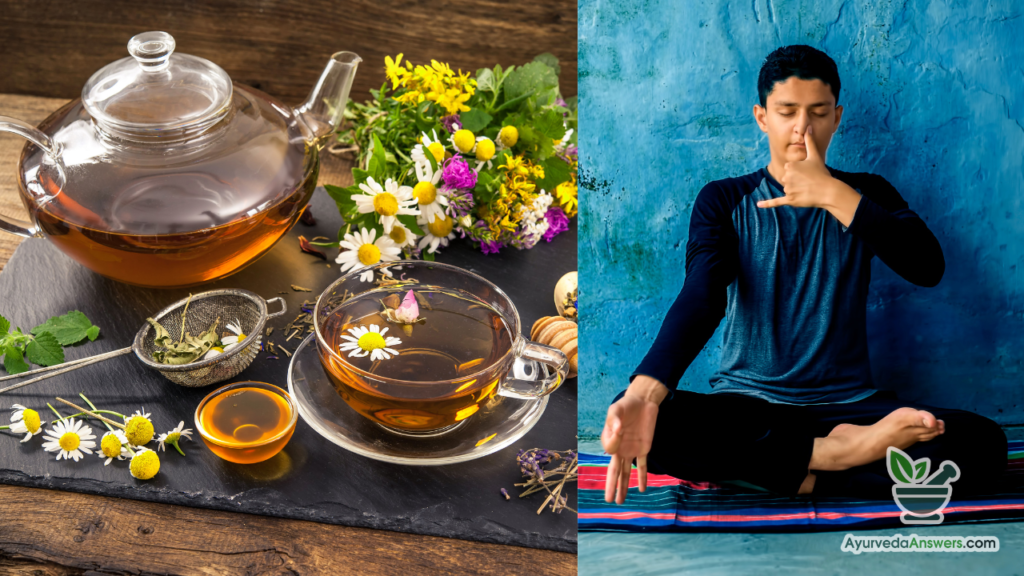Take a deep breath. Now exhale slowly. Isn’t it amazing how effortlessly we breathe? Our respiratory system is a marvel, constantly working to provide oxygen to every cell in our body. But sometimes, this intricate system can falter, leaving us struggling for breath.

Respiratory disorders encompass a wide range of conditions, from the common cold to chronic conditions like asthma and bronchitis. In the realm of Ayurveda, an ancient system of medicine originating from India, respiratory health is considered crucial for overall well-being.
Let’s delve into the Ayurvedic perspective on respiratory disorders, exploring their causes, symptoms, prevention, treatment, and the nurturing care they deserve.
Understanding Respiratory Disorders through Ayurveda 🌬️
In Ayurveda, the respiratory system is governed by the Prana Vata, a subdosha of Vata, which is responsible for all movement in the body, including breathing.
When Prana Vata is in balance, breathing is smooth, and respiratory health is optimal. However, imbalances in Prana Vata, as well as disturbances in other doshas (Vata, Pitta, and Kapha), can lead to various respiratory ailments.

Common Respiratory Disorders and Their Ayurvedic Insights 🤧
- Common Cold (Pratishyaya): The common cold is often caused by imbalances in the Kapha dosha, leading to congestion, runny nose, and sneezing. According to Ayurveda, exposure to cold, damp weather, or consuming Kapha-aggravating foods like dairy products, fried foods, and sweets can exacerbate symptoms.
- Asthma (Swasa Roga): Asthma is characterized by recurrent episodes of wheezing, breathlessness, and chest tightness. In Ayurveda, asthma is primarily seen as a Vata and Kapha disorder, with triggers including cold air, stress, allergens, and poor digestion.
- Bronchitis (Kasa Roga): Bronchitis involves inflammation of the bronchial tubes, leading to coughing, chest discomfort, and mucus production. According to Ayurveda, bronchitis is caused by an imbalance of the Kapha and Pitta doshas, aggravated by cold, damp conditions, and poor dietary habits.
Signs and Symptoms to Watch Out For 🧐
Recognizing the signs and symptoms of respiratory disorders is crucial for timely intervention and management. In Ayurveda, these may include:

- Congestion: Feeling of heaviness or blockage in the chest or sinuses.
- Cough: Dry or productive cough, often accompanied by phlegm.
- Breathlessness: Difficulty breathing or shortness of breath, especially during physical exertion.
- Wheezing: High-pitched whistling sounds while breathing, common in conditions like asthma.
- Fatigue: Generalized weakness or tiredness, often due to the body’s effort to fight off infection or inflammation.
Root Causes According to Ayurveda 🌿
Ayurveda emphasizes the importance of identifying and addressing the root causes of respiratory disorders. These may include:

- Imbalanced Doshas: Vata, Pitta, and Kapha imbalances can disrupt the normal functioning of the respiratory system.
- Weak Digestion: Poor digestion can lead to the accumulation of toxins (ama) in the body, contributing to respiratory ailments.
- Environmental Factors: Exposure to cold, damp weather, pollution, allergens, and toxins can aggravate respiratory symptoms.
- Stress and Anxiety: Emotional stress and anxiety can exacerbate respiratory conditions by increasing Vata and Pitta doshas.
Prevention: Nurturing Respiratory Health Naturally 🌱
Prevention is always better than cure, and Ayurveda offers holistic strategies to nurture respiratory health:

- Balanced Diet: Emphasize warm, cooked foods and spices that pacify Vata and Kapha doshas while avoiding cold, heavy, and processed foods.
- Herbal Support: Incorporate respiratory-friendly herbs like turmeric, ginger, tulsi (holy basil), licorice, and vasa into your daily routine to support lung function and immunity.
- Pranayama: Practice deep breathing exercises and pranayama techniques like Anulom Vilom and Bhastrika to strengthen the respiratory muscles and improve lung capacity.
- Nasal Care: Perform daily nasal cleansing (Neti) and oil massage (Nasya) to keep the nasal passages clear and moisturized.
- Stress Management: Engage in stress-reducing activities like yoga, meditation, and aromatherapy to calm the mind and balance the doshas.
Treatment: Healing from Within with Ayurveda 🌺
When respiratory disorders arise, Ayurveda offers personalized treatment approaches aimed at restoring doshic balance and promoting natural healing:

- Herbal Remedies: Ayurvedic formulations like Sitopaladi Churna, Talisadi Churna, and Trikatu churna are commonly prescribed to relieve congestion, cough, and inflammation.
- Panchakarma Therapy: Detoxification therapies like Vamana (therapeutic vomiting) and Virechana (purgation) may be recommended to eliminate toxins and restore balance.
- Swedana (Sudation): Steam therapy or herbal fumigation helps to liquefy and expel excess mucus from the respiratory tract.
- Dietary Modifications: Follow a dosha-balancing diet tailored to your constitution and current imbalances, avoiding foods that aggravate respiratory symptoms.
- Lifestyle Recommendations: Adopt a healthy lifestyle routine that includes adequate rest, regular exercise, and stress management practices.
Nurturing Care: Embracing Self-Compassion and Healing 🌈

In addition to physical treatments, nurturing care is essential for holistic healing:
- Self-Compassion: Be gentle with yourself during times of illness, practicing self-love and acceptance.
- Rest and Relaxation: Prioritize restorative sleep and relaxation to support the body’s natural healing processes.
- Connection: Seek support from loved ones, community, or spiritual practices to nourish the soul and cultivate resilience.
- Nature Therapy: Spend time in nature, breathing in fresh air and connecting with the healing power of the earth.
Conclusion:
Respiratory disorders can be challenging, but with the wisdom of Ayurveda, we can navigate these challenges with grace and resilience. By understanding the root causes, embracing preventive strategies, and seeking holistic treatments, we can cultivate vibrant respiratory health and breathe easy once again. Let’s honor our breath as a precious gift and cherish the journey of healing, one mindful inhale and exhale at a time. 🙏
Disclaimer : The techniques described in these articles are not intended as substitutes for professional medical advice or treatment. Consult a physician before trying any new health treatment. Do not stop or change prescribed medications without consulting your healthcare provider. The information provided is for educational purposes only. Results will vary based on individual factors. Always rely on the guidance of a qualified medical professional for any health concerns.
Read Our latest Articles:
- Ayurveda for Disc Bulge: Finding Relief Naturally
- Ayurveda for Alopecia Areata: Nurturing Hair Health Naturally
- Ayurveda for Asthma: Breathe Easy with Natural Solutions
- Ayurveda for Melasma: Embracing Natural Solutions for Clear, Radiant Skin
- Ayurveda for Dampness in the Body: Embracing Balance and Vitality
Leave a Reply